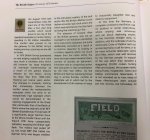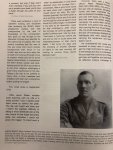This is a piece I wrote while doing my Masters in Military History. It's nothing too deep. But looks at some thoughts on the Dardanelles campaign. And how it can somewhat be considered a microcosm of the Great War itself.
Don't take it as holy writ. It was a single paper by a single Masters Candidate... among many other weekly papers. This was part of my Amphibious Warfare course. A very unique offering at the time. And I think, still, the only masters-level course on Amphib outside the War Colleges or NDU.
While it may be 'un-deep', it is one that I thought captured things rather well.
Cheers,
Sirhr
“An armed man is a citizen. An unarmed man is a subject. A disarmed man is a prisoner.” – Unknown
In analyzing the amphibious operation against the Dardanelles Peninsula – an assault that will go down in popular memory as “Gallipoli,” any analysis of the errors, follies, mistakes and blunders is bound to outweigh the successful aspects of the brief but costly campaign. The operation has been the subject of blame, debate, conjecture and myth virtually since it was ended with an evacuation of the surviving troops in 1915. And as with any operation that has been the subject of so much controversy, there are likely years more research to accomplish for the military historian.
As there are, realistically, too many items to list in terms of what went wrong for British and Australia New Zealand Auxiliary Corps (ANZAC) and French troops, we will gloss over them only briefly. One can cite the lack of proper and modern equipment; an unwillingness by command to commit sufficient troops early in the effort to take the peninsula; the inability of the Navy to provide adequate cover fire; diseases such as dysentery; weather; unit combat inexperience; challenging geography; challenges of communication, and a lack of joint/specialized training and preparation.[1] Any of these factors, alone, can make an already difficult and treacherous amphibious operation into a death-trap for the assaulting force. Unfortunately, as outlined by Robin Prior, in his book Gallipoli: The End of the Myth, the invading forces were saddled with all of these millstones, to one degree or another.
Yet, arguably, these factors can be mitigated, overcome or avoided with proper planning and proper leadership and it is in this area that the Gallipoli operations were doomed to failure from their inception.
Conceived as a way to “shorten the war” the British War council’s peripatetic Dardanelles plan evolved with little rhyme or reason, wending its way through argument and counter-argument until emerging as the ‘plan of least resistance.’ Some might argue that the Dardanelles offensive was merely the ‘also ran’ option that was among many plans which were being offered as panaceas for a looming ground war on the Continent. Presented by individuals such as First Lord of the Admiralty Winston Churchill, First Sea Lord Fisher; Secretary of State for War Lord Kitchner, among others, plans ranged from the impractical to the fanciful.[2] Some of these included assaults on the Dutch coast at, among other locations, the Isle of Borkum; an invasion of Pomerania and an assault on the Dalmation coast in modern-day Croatia. As note by Prior, the mood in the planning offices ranged from “Do something!!!!! We are waiting to be kicked!!!” to “LAND EVERYWHERE AT ONCE.”[3]
Ultimately, it seemed, that the only thing everyone could agree on was the somewhat harebrained scheme to “bombard and take the Gallipoli Peninsula, with Constantinople as its objective..”[4] As Prior states: “This was the War Council at its worst – unable to stick to a thorough discussion of any subject, discursive, rambling, incoherent… Not surprisingly the War Council’s conclusions reflected the discussion. In the end, Gallipoli was accepted because “there was little to be lost in an option that diverted no troops or ships (of any consequence) from the main theater of war.” [5]
The result of this incoherence of purpose and lack of commitment at a strategic level led to appalling bad planning and, by the time orders were passed down to naval, landing and invasion forces, they had become a comedy of bad assumptions (ie. the ridiculously small number of naval shells that would be needed to take forts); vague landing instructions as evidenced by the order to “land somewhere between Bibrunesi Point and Gaba Tepe… a stretch of coast 6 miles long,” and ill-considered logistical support.[6] As Prior pointed out, General Sir Ian Hamilton, a British field commander, “regarded the achievement of landing as an end in itself and had given little thought as to what should happen next.”[7] Given that an amphibious operation only begins at waters’ edge, it seems absurd that no thought had taken place to the post-landing plan.
Ultimately, a play-by-play of the ground combat following the landings is superfluous to the discussion of Gallipoli, for at its core, the landings themselves were successful. However the lack of an objective for troops once they had landed, combined with an utter lack of support, led to almost immediate stalemate and to a flurry of minor battles which did little but move Entente and Turkish troops short distances up and down the peninsula. Thus it is safe to say that while the British, French and ANZAC troops fought well at a tactical level, it was events prior to and following the landings themselves pre-ordained the Gallipoli operation to disaster.
Before completely condemning the British planners, perhaps it is fair to ask whether amphibious landings were possible at all circa. 1915? After all, there had been vast changes in military technology and new defensive capabilities such as rifled armor-piercing artillery, Maxim machine guns, Mills bombs (grenades), barbed wire and other new weapons designed to induce stalemate and frustrate offense. Is there an argument to be made that even with proper planning the Gallipoli operation was doomed from the start? Here I would argue that is not the case… for had the operation been properly planned – at least as well planned as a simple ground operation – using the timeless elements of intelligence, surprise, overwhelming force, proper logistics, etc. the operation should have been straightforward.
For example, a properly planned operation would have organized the Navy and ground components into a true combined operation. This was nothing new and had been undertaken at places like Vera Cruz and Ft. Fisher decades earlier. Proper planning would have had both the Navy and the ground troops arriving in the Dardanelles simultaneously, using the timeless element of surprise to rout the Turks off the peninsula before they could react. Ground forces could have landed, unopposed, at any of a number of beaches and, using raiding techniques, silenced the Turkish batteries (the guns were pointed at sea… unable to defend against a land attack) from the landward side. (Of note, this was the basic premise of T.E. Lawrence assault on Aqaba in July 1917 during the Arab Revolt)[8] By silencing the guns from land, the troops would have allowed minesweepers to clear the mine fields and allow the capital ships to move into the Dardanelles Straights, support the ground troops with covering fire to prevent Turkish reinforcements from moving down the peninsula, a fact not lost on Hamilton’s staff which concluded “the Navy cant [sic] do it alone.[9] Though, ultimately, the objective itself – a display of force aimed at the Ottoman Turks was ultimately suspect, at a tactical level proper planning using existing doctrine, technology and tactics could have made the Dardanelles portion of the operation successful. Unfortunately, the piecemeal way in which the operation was planned at a political level (with little regard for proper military planning) ensured that the mission’s chances of success at a tactical level were virtually zero. Thus we are back to condemning the planners…
With the decks already stacked against the Entente Powers attack, it almost seems unfair that the Turks had a number of factors that went in their favor, possibly the most important of which was the telegraphing of intentions to the Turkish high command by the early naval bombardments of the guns/forts on the peninsula beginning weeks before the actual land attack. Even without exact knowledge of what the Entente powers had in mind, it would have been clear to even the densest of military minds that ‘something is up’ once shells begin landing on your forts and obsolete battleships begin blowing up on your mines. The Turks also had geography and even climate in their favor, with the peninsula offering the defenders superb terrain while making life as difficult as possible for the ill-conditioned attackers.[10] Proper intelligence by the Entente powers would have revealed difficult currents and tides; challenging foliage (the bracken and scrub of the peninsula); stifling summer temperatures and stormy winter conditions which made Naval support difficult.[11] The Turks were also able to reinforce faster than the British, since they could march troops, by land, long before the Entente powers could organize forces and reinforce by sea.[12] Finally, the Turks were competently led and had a more limited mission of defense, vs. the Entente’s scattershot plans which as stated by Prior, often seemed only to be “designed only to improve the local tactical situation on various parts of the line.”[13] Ultimately, it can be argued that the Turks needed to do little to foil the British Strategy and that defeating the disorganized rabble put ashore by British planners was little more challenging.
With this in mind, I would like to offer a final thought on the affair, its planning origins which none of our authors did not bring up this week and, perhaps, is more a question for social historians or for sociologists than for a budding military historian… And that is the question of whether the leaders in the Entente governments at the outbreak of World War One had any regard for the fact that they were consigning their subjects to slaughter?
Note that in bringing this up, I do not say citizens… for, especially in the case of England, the soldiers and sailors were Crown or Commonwealth subjects, not citizens. One could argue that they were seen as property, not as sentient beings. I wonder whether this viewpoint could have been reflected in decision-making not only as divisions were being pumped not only into the meatgrinders of Sari Bair, Suvla Bay and Krithia, but into the trenches and killing grounds of Flanders and the Somme? Even in the pre-planning stages, Prior points out that the pre-Dreadnought ships that were being sent into the Dardelnnells Straight were expendable and “too old to face the modern enemy units and were therefore useless for action in the North Sea. So whatever the merits or demerits of the plan, it would hardly risk British naval superiority.[ 14] In a possibly even greater disregard for human life, the crews of these obsolete ships were regarded as “not first line” thus the loss of them appeared utterly incidental to the high command and the War Council.
Though I cannot say whether Prior lists all of the “disposable” pre-Dreadnought-class battleships that were resigned to the Dardanelles Campaign, he does mention the Implacable, the Inflexible, the Ocean, the Albion, the Agamemnon, Bacchante, Canopus, Swiftsure, Cornwallis, Triumph, Vengeance, Goliath, Irresistible, Prince George, the Prince of Wales. In addition, he mentions the Cruisers Sapphire and Euryalus (spelled Euryalis in Prior) and the French pre-Dreadnought’s Bouvet and Suffren. According to Conways’ All the World’s Fighting Ships 1860-1905, British pre-Dreadnought ships, in the various classes represented by the above ships, had wartime crews that averaged 750 -800 per ship during wartime.[15] Thus when the ships and their crews were written off by the war council as, basically, expendable, the political and military planners were willing to simply toss away 11,250 men on the British battleships alone!
In addition, the War Council, in beginning to discuss landings and troops, discussed the ‘surplus’ troops currently in England and not then needed for operations in Europe. Thus commitment of these ‘extra’ troops to the Dardanelles campaign was, again, regarded as being of little or no risk.[16] That is unless you were a “surplus” soldier being thrown into the fray.
So at the outset, one has a campaign which is, essentially, directionless and at best has an ephemeral effect on the war; being fought with ships and troops which are ‘obsolete and surplus,’ to accomplish a goal which, at best, may have a minor diplomatic impact on the war effort in influencing then-neutral Turkey and some Balkan nations’ in terms of their allegiance either to the Central Powers or the Entente Powers… a mission certainly best accomplished with diplomacy and statecraft, not with gunboat diplomacy and a show of force by obsolete battleships outside a neutral capital.
The result of this leads me to offer a thought that one needs somewhat look at Gallipoli through, perhaps, the lens of the highly-stratified society of Edwardian England, or more properly, pre-WW1 Europe. For it could be argued that at no time in modern English history had the gap between the ruling or privileged class and the working or poorer classes as great both in financial terms, but also in purely sociological terms. By the reign of Edward VII, the Dickensian dystopia of British society had reached epic proportions. And perhaps Gallipoli is evidence that, in the waning days of that gilded age, the under-classes were simply regarded as chattel, property or, with the outbreak of war, as little more than cannon-fodder by an insulated, privileged and out-of-touch national government led by a largely hereditary peerage.
Perhaps, as further evidence of this disconnect, we might look at the latter days of the Gallipoli campaign as the failures of the plebian soldiers to accomplish a haphazardly planned and ill-thought-out mission resulted in courts-martial and accusations that troops were derelict in their duties. Because, in the world-view of those who commanded armies, only a failure of the common soldier could have foiled their plans when, instead, an introspective or upward-looking analysis of the root cause of the failures of Gallipoli were more appropriate.[17]
Finally, this cycles back to a discussion we had a couple of weeks ago as to whether the advantage in amphibious warfare (or, perhaps more accurately warfare in general) goes to the totalitarian state or to a free state. While there are arguments to be made on both sides of that question the corollary may be to ask whether a nation-state with an army of sovereign citizens has the advantage, or whether a nation which regards its troops as property of the crown or the state has the advantage.
Again, this can probably go both ways, but at least for the common soldier, the choice may be fairly clear. It’s no fun to be thought of as cannon fodder.
1. T.A. Gibson, “Gallipoli, 1915,” in Assault from the Sea, ed. Lt. Col. Merrill L. Bartlett, USMC (Annapolis, MD: Naval Institute Press, 1983), 151.
2. Robin Prior, Gallipoli: The End of the Myth (New Haven, CT: Yale University Press, 2009), 3 – 19.
3. Ibid., 5-6.
4. Ibid., 19.
5. Ibid.
6. Ibid., 111
7. Ibid., 131
8. James J. Schneider, Guerilla Leader (New York, Bantam, 2011), 84-127.
9. Prior, Gallipoli, 68.
10. Gibson, Gallipoli 1915, 150.
11. Prior, Gallipoli, 41, 78, 193, 225-6.
12. Ibid., 130.
13. Ibid., 247, 206.
14. Ibid., 23.
15. Roger Chesneau, ed. Conway’s All the World’s Fighting Ships 1860-1905 (New York: Mayflower Books, 1979).
16. Prior, Gallipoli, 29.
17. Ibid., 223.





